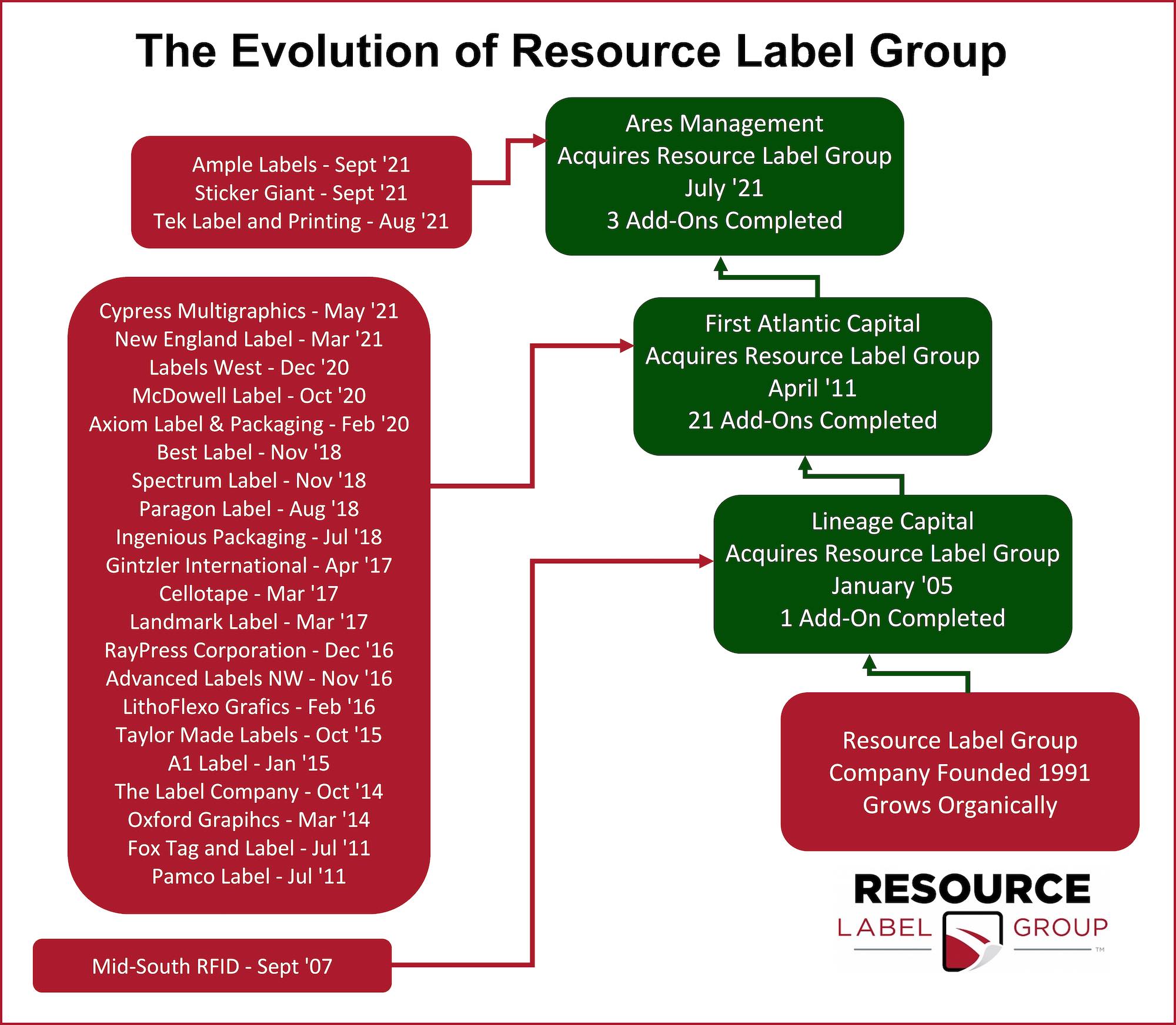
It’s a feeding frenzy in the prime label printing and converting business. Fueled by multiple private equity-backed roll-up platforms, the activity has been non-stop and does not appear to be ready to slow down until all the prime fruit has been picked.
Resource Label Group, which itself changed hands in July, was back at the closing table in September, announcing two more acquisitions in addition to the acquisition of Tek Label and Printing in August. In its most recent deal, Resource Label acquired Ample Labels based in Nixa, Missouri. The acquired company is a digital and flexographic printer of prime labels for the food, health, personal care, industrial, pharmaceutical, and beverage markets. Only four days earlier, Resource Label announced the purchase of StickerGiant.com, a producer of labels and stickers sold via an online storefront. StickerGiant.com would appear to fill a space at the lower end of the market, serving small companies, somewhat of a departure in the label roll-up space which has been focused on higher volume label manufacturers.
While not the only private equity-backed consolidator in the label industry, Resource Label is an exemplar of how the process of secondary, and now tertiary, buyouts by professional investment companies have provided the financial fuel needed to run a virtually non-stop acquisition process. At Resource Label, the buyout professionals did not skip a beat after the company switched financial sponsors from First Atlantic Capital to Ares Management; the team completed three acquisitions in less than three months.
Resource Label Group is not the only PE-fueled platform consolidating the label industry, nor is it the only platform that has flipped multiple times from one financial sponsor to another. Fort Dearborn was established in 1925 as a general printing company. By 1930, the founder had decided that printing labels was the business to be in, and other than a diversion during World War II to print top-secret strategic topographic maps for the war effort, Fort Dearborn has been focused on labels, shrink sleeves and related products. Fort Dearborn is now owned by Clayton, Dubilier & Rice, its fourth financial sponsor. The seller of Fort Dearborn, Advent International, acquired the company in 2016 from KRG Capital Partners, which previously acquired the company from Genstar Capital in 2010, which previously acquired the company from the individual non-institutional owners in 2006. At the time of its entry into the world of private equity backed growth, Fort Dearborn had six plants and revenue of $190 million, and with this latest deal is now part of a $3 billion revenue roll?up of roll?ups.
Simultaneous with the purchase of Fort Dearborn, PE firm Clayton, Dubilier & Rice also purchased Multi?Color Corporation from Platinum Equity. Multi?Color, now a global producer of labels, was established in 1916 as a manufacturer of sheet?fed three?color printing presses. The owners soon decided to pivot and transitioned to printing labels rather than making the machines. A seminal event in the company’s history was the development in 1980 of the in?mold label technology, in which labels are applied to plastic containers as the containers are being formed in the mold. Platinum Equity purchased Multi?Color in a take?private transaction in 2019, ending Multi-Color’s listing as a public stock which dated back to 1987. (For more, see Packaging Industry Consolidation in Every Direction – July 2021.)
In addition to the above mentioned PE funds, there are others also chasing label companies: Mason Wells, a private equity fund based in Milwaukee, just formed another entry into the PE-backed roll-up of the label business with the dual acquisition of KDV Label in Waukesha, Wisconsin, and its sister company I-Graphics, based in Loveland, Colorado. An additional recent entry into the mix is the mega fund H.I.G. Capital, no stranger to print-centric businesses. This past summer, H.I.G. acquired label and flexible packaging company Chromatic Productions, establishing its label platform company. Dunes Point Capital, based in Rye, New York, started out small and launched its label roll?up platform with the acquisition of Label Graphics Manufacturing in Little Falls, New Jersey. Not to be left out, in December 2020, Morgan Stanley Capital Partners acquired AWT Labels & Packaging from Mason Wells (yes, that Mason Wells, the same PE fund that just jumped back into the label business last month).
And let’s not leave out Brook & Whittle, the label platform now owned by Snow Phipps Group, which acquired the company in 2017 from RFE Investment Partners and Charter Oak Equity. Other PE-backed acquisition platforms in the label segment include Inovar, based in Dallas, with financial sponsorship from AEA Investors, and Fortis Solutions Group, based in Virginia Beach and operating 14 plants across the US, with financial backing from Main Post Partners.
Not all transactions in the label manufacturing segment are driven by large private equity-backed roll?ups. The Kennedy Group, a family-owned and family-managed manufacturer of labeling and packaging, acquired the business of Color Label in St. Louis, Missouri.* Based in Willoughby, Ohio, The Kennedy Group has production capabilities in pressure sensitive labels, roll-fed film, digital labels, and RFID labels and is actively seeking opportunities to grow via strategic acquisitions, offering an alternative to the PE-backed roll-ups.
Direct Mail and Commercial Printing
Postal Center International, a direct mail shop in Weston, Florida, announced the acquisition of Arrowmail in nearby Miami. In addition to direct mail services, PCI processes transactional print and provides presort services. The company recently announced its plan to establish a series of regional sites across the country, starting with a leased 100,000 square foot facility in San Antonio, Texas. According to the CEO, the company is seeking to “drive scale quickly, not only in San Antonio but also in other high-impact and highly centralized regions around the country” as part of the company’s nationwide expansion of regional office, production and presort mailing sites. Based on our conversations and mandates with other owners in the direct mail and transactional print segments, we suspect that PCI’s strategy of expanding direct mail production capability across several regions is being driven in direct response to the slowdown in US postal delivery time standards.
The commercial printing segment was noticeably quiet in September, with the exception of the acquisition of Taylored Printing by Richmond, Virginia-based Worth & Higgins, a diversified print provider of sheetfed offset, digital printing, wide format, and signage.
There has been a notable, but not yet dramatic, increase in the number of commercial printing companies filing bankruptcy, the majority of which have filed under Chapter 7 of the Code, which means the company is being liquidated without the opportunity to reorganize as is allowed under Chapter 11. This increase in bankruptcies has been expected since the outbreak of Covid-19, forestalled by the distribution and forgiveness of the ubiquitous PPP loans, the benefit of which is likely now, or soon will be, exhausted. Another factor that may increase pressure on financially challenged companies, especially within the commercial printing segment which has its own unique headwinds, is the unwinding of Covid-support measures which is likely to lead to an increase in the number of loans classified as non-performing, with corresponding increased pressure from lenders on borrowers.
Promotional
Commercial printing companies have increasingly been offering promotional and specialty advertising items to their customers. What was once a separate differentiated business is now being included in the integrated mix of marketing production and support services under the umbrella of many commercial printing companies.
Grossman Marketing, a 111-year old Massachusetts company, acquired Symbol Marketing & Promotions. Founded in 1910 by the current owners’ great grandfather as the Massachusetts Envelope Company, the company has transitioned from envelope manufacturing to a pure promotional products and print distributorship business model. The current acquisition is the Grossman brothers’ eighth, all of which strategically support its asset-light service model.
Reno Type, a printing and mailing company, acquired CDMS, a promotional products distributor in nearby Sparks, Nevada. BR Printers, based in San Jose, California, a commercial printing and book manufacturing company with extensive production capabilities, certainly not an asset-light company, acquired Casa del Mar, a San Diego-based promotional products distributor. While not every commercial printing company is embracing the promo business, the trend towards becoming an integrated marketing service provider will continue, often via an acquisition strategy.
* Graphic Arts Advisors, publisher of The Target Report, provided outreach to identify the opportunity and served as exclusive advisors to The Kennedy Group in this transaction.
View The Target Report online, complete with deal logs and source links for September 2021


















